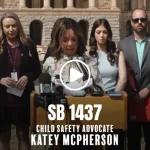
Arizona’s SB 1437: A Common-Sense Law That Finally Holds Schools Accountable
August 16, 2025
The “No Trouble Bubble” Every Parent Needs: How Trust Beats Fear
August 16, 2025
When a Signature Becomes a Loophole
What if someone could walk into your child's school, claim to be their caregiver, and walk out with legal authority—all with nothing more than a signed paper and an ID?
No judge. No background check. No parental approval.
That's the nightmare scenario critics are sounding alarms about with California Assembly Bill 495—legislation that's being praised as a "family preparedness tool" but is raising deep concern among parental rights advocates across the state.
AB 495 may have good intentions—but as always, the devil is in the details.
What Is AB 495? Understanding the Family Preparedness Plan Act
Assembly Bill 495 was introduced by Assemblymember Celeste Rodriguez (D–San Fernando) in response to immigration enforcement actions that have separated families without warning.
The bill aims to give parents a way to plan ahead for emergencies by:
- Allowing non-relative adults (mentors, neighbors, family friends) to temporarily care for children using a Caregiver's Authorization Affidavit—without needing court approval or a parent's signature.
- Creating a new short-term joint guardianship process in family court that can activate only if a parent is detained, deployed, hospitalized, or otherwise unavailable.
- Mandating school and daycare policies that prevent cooperation with federal immigration enforcement without proper court documentation.
- Prohibiting daycares from collecting or sharing immigration status information.
Proponents say it's a safety net for kids. Critics argue it opens the door to abuse.
How It Works: The Legal Mechanisms in Plain English
1. The Affidavit
Any trusted adult—defined as a "non-relative extended family member" (NREFM)—can sign a form saying they have a relationship with the child or their family. That form allows them to:
- Enroll the child in school
- Authorize routine medical or mental health care
- Make day-to-day parenting decisions
This does not require a parent's consent. The adult simply signs under penalty of perjury.
2. Short-Term Guardianship
A parent can pre-designate someone to act as a joint guardian if something happens (such as being detained or hospitalized). This guardianship only activates during the emergency and can end automatically once the parent returns.
Records of this guardianship are sealed and can't be shared with immigration enforcement.
3. School & Daycare Policies
Schools and childcare centers must:
- Adopt state-issued model policies that limit cooperation with immigration enforcement
- Notify parents about their rights
- Follow a parent's emergency contact instructions before involving authorities
Why Supporters Call It Humane
Supporters of AB 495 argue that the bill addresses a serious gap. They point out that immigration enforcement actions—including ICE detentions and deportations—have left children without care plans, which at times led to foster placements or traumatic instability at school. At the Assembly Judiciary Committee hearing, Assemblymember Celeste Rodriguez, the bill's author, emphasized that "existing tools … lack clarity and enforceability," noting that caregiver affidavits were frequently rejected by schools, doctors, and agencies. AB 495 clarifies parental intent and ensures uniform acceptance of caregiving forms, allowing non-relative extended family members to care for the child in emergencies while maintaining parental involvement, even if out of the country—especially in immigration-related separations.
Why Critics Say It's Dangerous
Conservative and parental rights advocates strongly disagree.
They argue AB 495:
- Allows adults with no court oversight to claim caregiving rights
- Lacks safeguards, like background checks or parent notification
- Opens a legal path for exploitation by bad actors
- Erodes parental control by permitting non-parents to make medical, educational, and mental health decisions
Attorney Erin Friday of Our Duty calls it:
"A child trafficker's and kidnapper's dream bill… No background check. No oversight. Just a form and an ID."
Attorney Nicole Pearson echoed those fears:
"This is not fear‑mongering. I'm not being hyperbolic… These unintended consequences are terrifying, and they are unavoidable."
Pastor Jack Hibbs – "run with your kids"
He said on the California Family Council site:
"I have to tell you, if this bill passes, I am going to ask you to leave the state of California… You got to get out. You got to run with your kids. You got to go."
Critics also raise concerns that medical authority under the affidavit could include mental health care or gender-transition-related decisions, given other California laws around minor consent.
Comparing It to Other States: A Trend or an Outlier?
AB 495 isn't the first bill of its kind—but it may go further than most.
New York
Passed a similar standby guardianship law in 2018 for immigration-related separations, but requires court involvement and parent consent.
Illinois
Allows short-term guardianship via power of attorney, but the parent must sign, and forms must be notarized.
California's AB 495
- Permits unrelated, non-court-vetted adults to act as caregivers
- Does not require parental consent for the affidavit
- Limits government transparency by sealing records from public view
The direction is similar—but California's version is broader and looser in execution.
From a Parental Rights Perspective: Red Flags Everywhere
This isn't about opposing preparedness. It's about protecting parental authority—and children.
There's a right way to plan for emergencies. Involving courts. Requiring consent. Establishing clear lines of communication.
AB 495, instead, gives legal rights to people who may not have any formal relationship with a child's parents—and does so with zero requirement for oversight.
When a form can override a family's wishes, we're not talking about safety. We're talking about state-sanctioned overreach.
Can Both Be True? Yes—and That's the Problem
It's possible to believe that:
- Parents facing detention or hospitalization should have a way to keep their kids safe
- And also believe that every adult with custody-like authority should be vetted and verified
But AB 495 picks a side—and it's the side of fast, flexible access with minimal scrutiny.
Even if 99% of uses are legitimate, the 1% matters.
When the state empowers a non-relative adult to make decisions over a child without court or parent approval, we've crossed a line.
Final Thoughts: Good Intentions Aren't Enough
There's no doubt that AB 495 was crafted in response to real fear. But fear-based legislation often overcorrects—and that's what's happening here.
If this bill becomes law:
- Parents in California must understand how vulnerable their rights have become
- Schools and daycares must prepare for conflicting instructions and legal exposure
- And voters must decide if convenience is worth the risk to their children's safety
Emergency planning should not come at the cost of parental rights.


